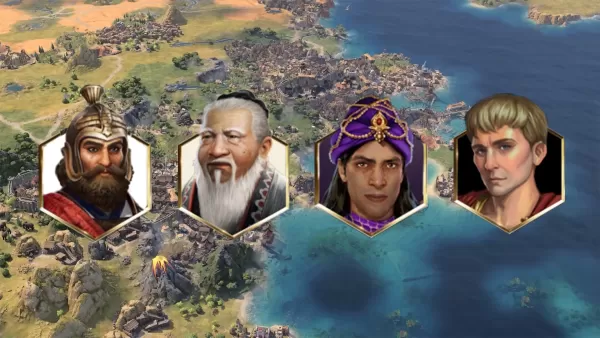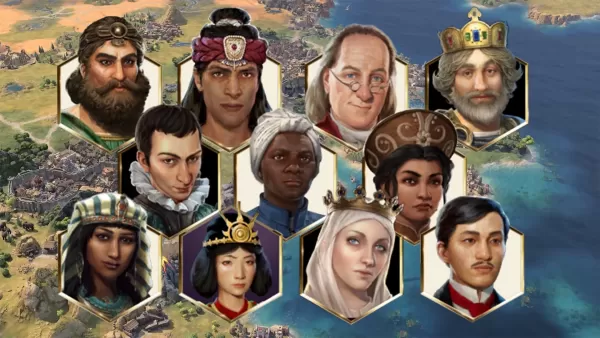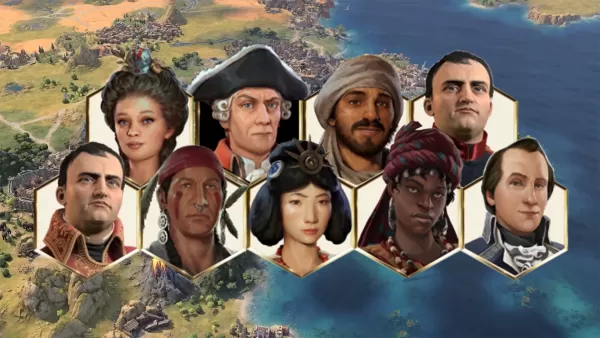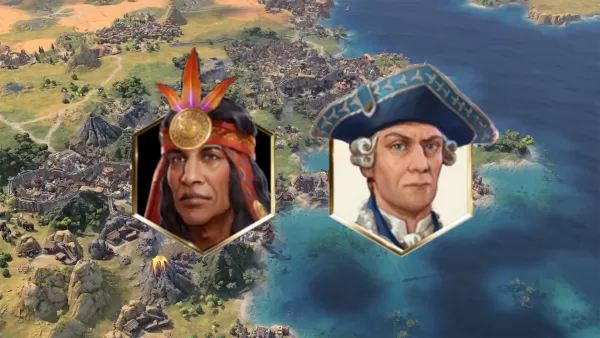Top Civilization 7 Leaders Ranked
In *Civilization 7*, the introduction of the Ages mechanic marks a significant evolution in the series, allowing players to transition their civilization through different eras—Antiquity, Exploration, and Modern Ages. However, your chosen leader remains constant throughout the game, making their abilities crucial to your strategy.
Leaders in *Civilization 7* may not offer as many traits and units as civilizations, but their unique abilities can lead to powerful synergies. To help you navigate the leader selection process, we've compiled a comprehensive tier list, focusing on their strengths and weaknesses in a standard, single-player game. This guide excludes multiplayer considerations and DLC leaders like Ada Lovelace and Simón Bolívar.
Best Civ 7 Leaders
Civilization 7 Leader Tier List
S-Tier - Confucius, Xerxes King of Kings, Ashoka World Conquerer, Augustus
A-Tier - Ashoka World Renouncer, Benjamin Franklin, Charlemagne, Harriet Tubman, Hatshepsut, Himiko High Shaman, Isabella, Jose Rizal, Machiavelli, Trung Trac, Xerxes The Achaemenid
B-Tier - Amina, Catherine The Great, Friedrich Oblique, Ibn Battuta, Lafayette, Napoleon Emperor, Napoleon Revolution, Tecumseh, Himiko Queen of Wa
C-Tier - Friedrich Baroque, Pachacuti
S-Tier Leaders

S-Tier: Ashoka, World Conquerer
Ashoka, World Conquerer excels at leveraging happiness to fuel military expansion. With +1 Production for every 5 excess Happiness in cities, and +10% Production in settlements not founded by you, Ashoka can rapidly build up forces. Declaring a Formal War grants a Celebration, boosting all units with +5 Combat Strength against Districts, making Ashoka formidable in combat. The key to success with Ashoka is maintaining high happiness levels to sustain this powerful production advantage.
S-Tier: Augustus
Augustus thrives on expanding through settlements, gaining +2 Production in the Capital for every Town and the ability to purchase Culture Buildings in Towns. Additionally, a 50% discount on Gold for purchasing Buildings in Towns accelerates his growth. Augustus's strategy involves maintaining numerous Towns without upgrading them to Cities, maximizing his Gold and Production output. This approach allows Augustus to build a robust empire with a strong cultural and economic foundation.
S-Tier: Confucius
Confucius is a powerhouse for city growth and technological advancement. With a 25% Growth Rate increase in Cities and +2 Science from Specialists, Confucius can expand his territory and lead in scientific progress. Early land acquisition is crucial, allowing Confucius to secure key resources before competitors. While he may need assistance in defense, his technological edge and rapid expansion make him a top choice for players focusing on growth and science.
S-Tier: Xerxes, King of Kings
Xerxes, King of Kings is tailored for aggressive players aiming for a Military Victory. His units gain +3 Combat Strength when attacking in neutral or enemy territory, making him a formidable force. Capturing a Settlement for the first time yields 100 Culture and Gold per Age, with a +10% Gold increase in all settlements, further incentivizing expansion. Xerxes's higher Settlement limit per Age enables him to conquer and control more territory, reinforcing his military dominance.
A-Tier Leaders

A-Tier: Ashoka, World Renouncer
Ashoka, World Renouncer focuses on population growth through happiness, gaining +1 Food in Cities for every 5 excess Happiness and +10% Food in all Settlements during a Celebration. All buildings also gain +1 Happiness adjacency for Improvements, promoting city development without the unrest from conquest. This leader suits players who prefer a peaceful expansion strategy and efficient city management.
A-Tier: Benjamin Franklin
Benjamin Franklin is ideal for players pursuing a Science victory. He gains +1 Science per Age on Production Buildings in Cities and a 50% Production boost towards constructing them. Additionally, active Endeavors he starts or supports contribute +1 Science per Age, and he can manage two Endeavors of the same type simultaneously. Franklin's abilities create a synergistic cycle of scientific advancement and production efficiency.
A-Tier: Charlemagne
Charlemagne combines Military and Science for a potent strategy, gaining Happiness adjacency for Military and Science Buildings in Quarters. Entering a Celebration provides two free Cavalry Units and a +5 Combat Strength boost for Cavalry. This leader is perfect for players who want to leverage early and mid-game cavalry to establish a strong empire, although his effectiveness may wane in the Modern Age.
A-Tier: Harriet Tubman
Harriet Tubman is the master of espionage and defensive warfare, with a 100% Influence boost towards initiating Espionage Actions and 5 War Support for wars declared against her. Her units ignore movement penalties from Vegetation, enhancing their mobility. Harriet's abilities make her a stealthy choice for players who enjoy disrupting opponents and maintaining a strong defensive position.
A-Tier: Hatshepsut
Hatshepsut is a cultural powerhouse, gaining +1 Culture for every imported Resource and a 15% Production boost towards constructing Buildings and Wonders near Navigable Rivers. This leader benefits from establishing Trade Routes to maximize her cultural output, making her ideal for players aiming for early cultural dominance.
A-Tier: Himiko, High Shaman
Himiko, High Shaman is unmatched in Culture generation, gaining +2 Happiness per Age on Happiness Buildings and a 50% Production boost towards constructing them. Her +20% Culture boost doubles during Celebrations, though it comes with a -10% Science penalty that also doubles. Himiko is perfect for players focused on cultural victories, requiring careful management of Science to counterbalance her cultural advantages.
A-Tier: Isabella
Isabella can surge ahead early with 300 Gold for discovering a Natural Wonder, doubled if in Distant Lands. She also gains 100% additional tile yields from Natural Wonders and a 50% Gold discount on Naval Units with reduced maintenance costs. Isabella's success hinges on securing Natural Wonders, making her a strong choice for players who can leverage these unique map features.
A-Tier: Jose Rizal
Jose Rizal excels at extending and enhancing Celebrations, gaining a 50% increase in Celebration duration and Happiness towards Celebrations. He also earns additional Culture and Gold from Narrative Events, which occur more frequently for him. Jose Rizal is ideal for players who want to capitalize on the benefits of frequent and prolonged Celebrations.
A-Tier: Machiavelli
Machiavelli is a master of diplomacy and deceit, gaining +3 Influence per Age and 50 Gold per Age for accepted Diplomatic Action proposals, or 100 Gold for rejected ones. He can declare Formal Wars without Relationship requirements and levy Military Units from City-States he isn't Suzerain of. Machiavelli suits players who enjoy manipulating the political landscape to their advantage.
A-Tier: Trung Trac
Trung Trac is the leader of choice for utilizing Army Commanders, starting with three free levels on her first Commander and a 20% Commander experience boost. She also gains +10% Science in Cities in Tropical Spaces, doubled during declared Formal Wars. Trung Trac is perfect for players who want to leverage the new Army Commander mechanics to dominate military engagements.
A-Tier: Xerxes, The Achaemenid
Xerxes, The Achaemenid excels in economic expansion, gaining +1 Trade Route limit with all leaders and 50 Culture and 100 Gold per Age for creating Trade Routes or Roads. He also gains +1 Culture and Gold per Age on Unique Buildings and Improvements. Xerxes is ideal for players aiming for an Economic Victory through robust trade networks and infrastructure development.
B-Tier Leaders

B-Tier: Amina
Amina focuses on resource management, gaining +1 Resource Capacity in Cities and +1 Gold per Age for each Resource assigned to Cities. Her units gain +5 Combat Strength on Plains or Desert, though this is situational. Amina is suitable for players who prioritize resource utilization and can capitalize on specific terrain advantages.
B-Tier: Catherine the Great
Catherine the Great is a strong cultural leader, gaining +2 Culture per Age on displayed Great Works and an additional slot for buildings with Great Works. Cities settled in Tundra gain Science proportional to their Culture. Catherine is ideal for players who can utilize Tundra and focus on cultural achievements through Great Works.
B-Tier: Friedrich, Oblique
Friedrich, Oblique enhances Army Commanders with the Merit Commendation and gains an Infantry Unit when constructing a Science Building. While powerful, his lack of direct Science, Influence, or Culture boosts can hinder his competitiveness against more specialized leaders. Friedrich suits players who want to focus on early military advantages through Commanders.
B-Tier: Ibn Battuta
Ibn Battuta offers flexibility with 2 Wildcard Attribute Points after the first Civic in every Age and +1 Sight for all Units. He also gains a unique Endeavor called Trade Maps to see other leaders' explored areas. Ibn Battuta is suitable for experienced players who can leverage his versatility and map knowledge effectively.
B-Tier: Lafayette
Lafayette provides a unique Endeavor called Reform, granting additional Social Policy slots, and +1 Combat Strength for every Tradition slotted into Government. He also gains +1 Culture and Happiness per Age in Settlements, doubled in Distant Lands. Lafayette is a good choice for players who enjoy a balanced approach to governance and expansion.
B-Tier: Napoleon, Emperor
Napoleon, Emperor thrives on antagonizing others, gaining +8 Gold per Age for every leader he's Unfriendly or Hostile with. His Continental System Sanction reduces other leaders' Trade Route limits, but at the cost of significant Relationship penalties. Napoleon suits players who enjoy a more aggressive diplomatic strategy.
B-Tier: Napoleon, Revolutionary
Napoleon, Revolutionary boosts all Land Units with +1 Movement and gains Culture equal to 50% of enemy Combat Strength when defending. This leader requires a unique playstyle, provoking enemies while holding ground to maximize Culture gains. Napoleon is ideal for players who enjoy a dynamic and defensive approach.
B-Tier: Tecumseh
Tecumseh gains +1 Food and Production per Age in Settlements for every City-State he's Suzerain of, along with +1 Combat Strength for all units. However, becoming a Suzerain requires significant Influence, which Tecumseh lacks inherent traits for. He suits players who can invest in the right infrastructure to leverage City-State alliances.
B-Tier: Himiko, Queen of Wa
Himiko, Queen of Wa excels at fostering alliances, gaining +4 Science per Age for every leader she's Friendly or Helpful with. Her unique Endeavor, Friend of Wei, grants +25% Science to both her and her ally. Himiko suits players who prefer a diplomatic approach and can maintain positive relations to boost their Science output.
C-Tier Leaders

C-Tier: Friedrich, Baroque
Friedrich, Baroque gains a Great Work when capturing a Settlement for the first time and an Infantry Unit when constructing a Culture Building. While these traits are useful, they lack the impact to compete with more powerful leader abilities. Friedrich is suitable for players who enjoy a blend of cultural and military expansion but may struggle against stronger leaders.
C-Tier: Pachacuti
Pachacuti gains +1 Food adjacency bonus for Mountains and no Happiness maintenance cost for Specialists adjacent to Mountains. While potentially powerful with favorable map conditions, Pachacuti's effectiveness is highly dependent on terrain. He suits players who can strategically select maps with ample Mountain features to maximize his potential.
-
Build A Rocket Boy has initiated redundancy procedures following the troubled release of MindsEye, potentially impacting more than 100 employees, according to studio sources speaking with IGN.An anonymous insider revealed that while the exact numberAuthor : Sarah Feb 21,2026
-
Fans of dark fantasy RPGs will likely remember Vampire’s Fall: Origins, which launched back in 2018. Its gothic world of witches, vampires, and militia recruits left a distinct impression. Now, a sequel has arrived: Vampire’s Fall 2 is officially avaAuthor : Aaron Feb 19,2026
- HoYo Fest 2025: Fresh Updates on Comeback
- Mastering Two-Handed Weapons in Elden Ring: A Guide
- Roblox Simulator Codes: Unlock Exclusive Rewards!
- Ultimate Guide to Shinigami Progression in Hollow Era
- Wuthering Waves: Uncover the Secrets of Whisperwind Haven's Palette
- Top 25 Palworld Mods to Enhance Your Game






















